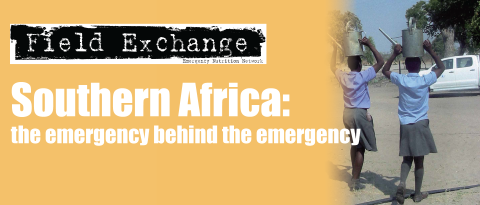Commentary: Regional Training on Integrated Management of Severe Malnutrition
By Ann Ashworth and Steve Collins
WHO and UNICEF came together in Tanzania in September 2006 to hold a joint training on the Integrated Management of Severe Malnutrition. The participants were health practitioners with responsibility for managing severely wasted or oedematous children (severe acute malnutrition), WHO and UNICEF regional advisors and nutrition officers, and ministries of health staff responsible for planning and implementing programmes to prevent and treat malnutrition. Eight countries from East and Southern Africa were represented: Eritrea, Ethiopia, Kenya, Tanzania, Uganda, Botswana, Namibia and Lesotho.
Community-based care and inpatient management are complementary components of an integrated approach to treating children with severe acute malnutrition, but in recent years there has been an unfortunate tendency for the two components to be seen as competitors. The idea for an Integrated Training arose at a Malnutrition Task Force meeting in May 2006 and the idea was discussed with WHO and UNICEF, who took it forward promptly and willingly in collaboration with the Food and Nutrition Technical Assistance Project (FANTA). The aim is to reduce deaths from severe acute malnutrition by active-case finding and intervening early before a child's condition deteriorates, community mobilisation to improve access and understanding and achieve high coverage, treating uncomplicated cases in the community, and improving facility-based management.
The training was held at Muhimbili University College of Health Sciences, Dar es Salaam. The first training day began by outlining the key components of community-based and facility-based care, and their integration. Experiences of integrated management were shared, as well as lessons learned in scaling-up national programmes. The main facilitators were Ann Ashworth, Steve Collins, Tanya Khara, Anne Walsh, Theresa Banda, Chantal Gegout, Beatrice Amadi and Paluku Bahwere. Participants then focused either on communitybased management (September 26-28th) or facility-based management (September 26- 30th). On the last day of the joint training, the community-based and facility-based participants formed eight country teams to plan posttraining actions together. These centred around how to move forward in an integrated manner; who to involve; issues to be discussed; support needs; and timeframe. Peter Hailey (UNICEF Regional Office, Nairobi) guided participants in these activities.
Over 60 people attended, all of whom have the potential to make a real difference in reducing malnutrition-related deaths. Both Flora Sibanda-Mulder (UNICEF New York) and Denise Coitinho (WHO Geneva) in their opening addresses described the joint training as a milestone. Not only did it demonstrate the integration of community-based and facility-based care, but WHO, UNICEF, VALID and FANTA worked in partnership and set the example of moving forward together. It was agreed by all that it was not acceptable to think of community- based care in competition with facility-based care, as both approaches complemented each other. Real commitment from governments, however, will be needed to achieve high coverage and low mortality. It is hoped that this integrated training will be the first in a series of UNICEF and WHO collaborations to roll out the integrated management of severe acute malnutrition globally.
Imported from FEX website


